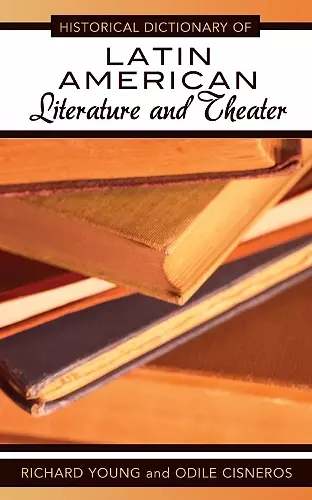Historical Dictionary of Latin American Literature and Theater
Richard Young author Odile Cisneros author
Format:Hardback
Publisher:Scarecrow Press
Published:18th Dec '10
Currently unavailable, and unfortunately no date known when it will be back

The Historical Dictionary of Latin American Literature and Theater provides users with an accessible single-volume reference tool covering Portuguese-speaking Brazil and the 16 Spanish-speaking countries of continental Latin America (Argentina, Bolivia, Chile, Colombia, Costa Rica, Ecuador, El Salvador, Guatemala, Honduras, Mexico, Nicaragua, Panama, Paraguay, Peru, Uruguay, and Venezuela). Entries for authors, ranging from the early colonial period to the present, give succinct biographical data and an account of the author's literary production, with particular attention to their most prominent works and where they belong in literary history.
The introduction provides a review of Latin American literature and theater as a whole while separate dictionary entries for each country offer insight into the history of national literatures. Entries for literary terms, movements, and genres serve to complement these commentaries, and an extensive bibliography points the way for further reading. The comprehensive view and detailed information obtained from all these elements will make this book of use to the general-interest reader, Latin American studies students, and the academic specialist.
Number 45 in Scarecrow’s Historical Dictionaries of Literature and the Arts series encompasses the Spanish and Portuguese literatures of Mexico, Central America, and South America, from the diaries of Christopher Columbus (preserved by Bartolomé de las Casas) to short stories, plays, novels, and other forms of the present day. The countries of the Caribbean, often treated as a separate entity, are excluded. Author Young is professor emeritus of Spanish and Latin American studies at the University of Alberta, and author Cisneros is an associate professor at the same university. Following a chronology and introduction, the 500-page dictionary section is composed almost entirely of biographical entries ranging from a paragraph to a couple of pages for the best-known authors, including Jorge Luis Borges, Carlos Fuentes, and Gabriel García Márquez. Each entry includes the author’s country (though many long resided elsewhere), dates, brief biographical and literary highlights, and titles of major works (in the original language and in English, with clear indication whether there is an English translation). There is an entry for the literature and theater of each country as well as entries for movements, terms, and genres, such as Ultraísmo, Boom, and Historical novel. Cross-referencing within and following entries is extensive. A bibliography of nearly 200 pages is arranged by country, with bibliographies, encyclopedias, dictionaries, histories, and anthologies (or some subset) followed by works on particular authors; these resources are in Spanish, Portuguese, and English. Recommended for academic libraries and public libraries where the literature of Latin America is important. * Booklist *
Young (emer., Univ. of Alberta) and Cisneros (Univ. of Alberta) offer a comprehensive treatment of Latin American literary arts from the conquest to the 21st century. Given the scope of the topic and the historical dictionary format, the entries are succinct yet deliver tantalizing introductions to authors, literary movements, themes, and national literary histories. The stage is set with a literary chronology that begins with Christopher Columbus's arrival and his diary, and extends to the 2010 award of the Nobel Prize for literature. Entries are extensively cross-referenced. Bold typeface within entries indicates terms covered elsewhere in the dictionary, allowing researchers to move quickly between authors, countries, and literary movements. Many entries contain see also references to related topics. An expansive bibliography at the end of the entries is organized geopolitically with selected references for all authors included therein. This organization requires an inordinate amount of thumbing through pages when searching for individual authors. Headers indicating countries covered within sections would have solved this problem. The breadth of the bibliography will be helpful to researchers pursuing deeper investigation. Summing Up: Recommended. Libraries with a strong commitment to Latin American studies; lower- and upper-level undergraduates, and general readers. * Choice Reviews *
Scenic articles on national literatures do see that the present volume is a dictionary of Latin American literature and at the same time, an introduction to it. As such, it is obviously intended for academic use in the English-speaking world. * Iberoamericana *
This dictionary deserves attention because it began a project that we hope will continue throughout the years. It is a valuable contribution to the collection of reference books in our classes of Latin American literature and culture. * Hispania *
- Winner of RUSA ALA Outstanding Reference Award Finalist 2012
ISBN: 9780810850996
Dimensions: 225mm x 155mm x 50mm
Weight: 1102g
748 pages